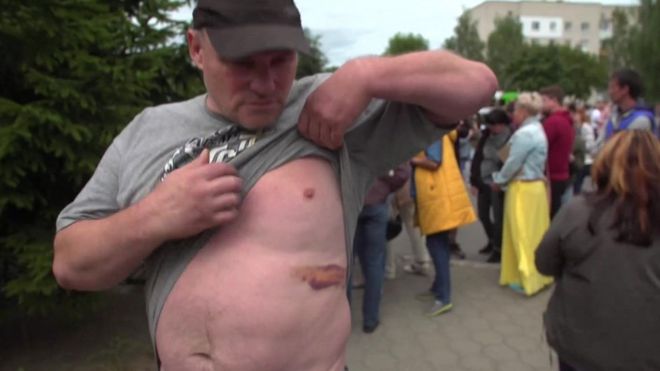

Detainees have emerged from a notorious detention centre in Belarus giving horrific details of attacks and beatings during days in custody since Sunday’s widely disputed election.
Amid mounting reports of police brutality, Amnesty International said it indicated “widespread torture”.
As EU foreign ministers prepared to meet to consider new sanctions, Belarus promised to free the 6,700 detainees.
Belarus is seeing a sixth day of protests since its presidential vote.
Alexander Lukashenko was declared the victor by election authorities, but supporters of the main opposition figure, Svetlana Tikhanovskaya, insist she won. The EU and US have condemned the election as neither free nor fair.
In a statement on state television, Senate speaker Natalya Kochanova said the president had ordered an investigation into the mass detention of protesters, and that more than 1,000 had been freed.
All the remaining detainees were to be released on Friday morning, Deputy Interior Minister Alexander Barsukov said, while denying that prisoners had been abused.
‘Torture chambers’
The BBC has spoken to several people, including teenagers, who have described being beaten.
“They beat people ferociously, with impunity, and they arrest anyone. We were forced to stand in the yard all night. We could hear women being beaten. I don’t understand such cruelty,” one man said as he showed the BBC his bruising.
Released prisoners shared pictures on messaging app Nexta showing their bruised and swollen bodies, including injuries to backs and buttocks that they alleged were caused by police.
Amnesty International said detainees described being stripped naked, beaten and threatened with rape.
“Former detainees told us that detention centres have become torture chambers, where protesters are forced to lie in the dirt while police kick and beat them with truncheons,” said Marie Struthers, Amnesty International’s Director for Eastern Europe and Central Asia.
In audio shared by a BBC journalist, screams could be heard from inside the Okrestina detention centre in the capital Minsk.
Separately, a group of five UN human rights experts said the response of the security forces to peaceful protests had been harsh, with frequent use of excessive, unnecessary and indiscriminate force.
“Authorities only seem interested in quickly dispersing the protests and arresting as many people as possible,” they said in a joint statement.
What will the EU do?
EU foreign ministers are meeting on Friday to consider possible sanctions on Belarus because of the crackdown. The bloc has imposed sanctions before but eased the measures several years ago when President Lukashenko released other detainees.
Czech Prime Minister Andrej Babis said sanctions should be imposed “until free and transparent elections are held in Belarus with the participation of international observers”. He said he had the support of Poland’s Mateusz Morawiecki, who said he would put forward a “solidarity with Belarus” plan on Friday in the Polish parliament.
The EU has already dismissed the presidential vote as “neither free nor fair”, an assessment backed by US Secretary of State Mike Pompeo. Lithuania’s president has said Mr Lukashenko is no longer Belarus’s legitimate leader.
Earlier, Belarus Interior Minister Yuri Karayev said he took responsibility for people being injured during the protests, and that he wanted to apologise to those who got caught up in the violence.
BBC